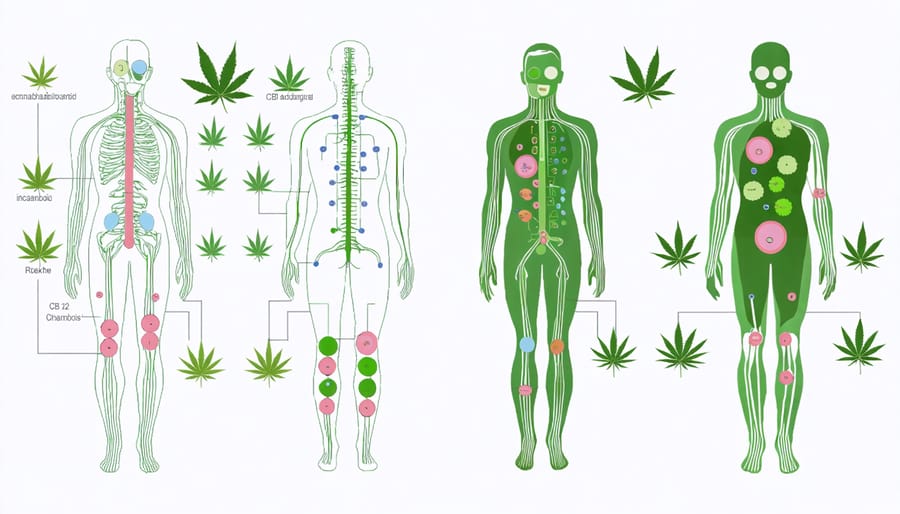CBD oil emerges as one of the most promising natural remedies in modern medicine, offering relief for conditions ranging from chronic pain to anxiety. As 1 CBD Canada wide becomes increasingly accessible, healthcare professionals and researchers continue to uncover the remarkable medicinal benefits of cannabis compounds, particularly CBD. This non-psychoactive cannabinoid works by interacting with the body’s endocannabinoid system, a complex network responsible for maintaining balance in various physiological processes.
Recent clinical studies demonstrate CBD’s potential to reduce inflammation, manage seizures, and alleviate symptoms of anxiety and depression without the side effects commonly associated with traditional pharmaceuticals. From chronic pain patients finding renewed mobility to individuals managing stress-related disorders, CBD oil’s therapeutic applications continue to expand, backed by growing scientific evidence and countless success stories from users worldwide.
As research advances and regulatory frameworks evolve, CBD oil stands at the forefront of natural medicine, offering hope to those seeking alternative treatment options while challenging conventional approaches to health and wellness.
How CBD Oil Works in Your Body
The Endocannabinoid System Explained
The endocannabinoid system (ECS) is a complex network of receptors and chemical signals that helps maintain balance throughout your body. Think of it as your body’s natural control center for maintaining harmony. This system plays a crucial role in regulating various functions, including mood, sleep, appetite, pain sensation, and immune response.
The ECS consists of three main components: endocannabinoids (naturally produced cannabis-like compounds), receptors (CB1 and CB2), and enzymes. CB1 receptors are primarily found in the brain and nervous system, while CB2 receptors are mainly located in the immune system and peripheral tissues.
When you use CBD oil, it interacts with this system, but not in the same way as THC. Instead of binding directly to receptors, CBD works indirectly by influencing how your body’s natural endocannabinoids work. It can also affect non-cannabinoid receptors and channels, which explains its wide range of potential therapeutic effects.
Understanding how the ECS works helps explain why CBD oil might benefit various conditions – it’s working with a system that’s already actively maintaining your body’s balance.

CBD’s Path Through Your Body
When you consume CBD oil, it begins an intricate journey through your body. The oil first enters your bloodstream, either through absorption under your tongue (sublingual) or through your digestive system when swallowed. From there, CBD interacts with your body’s endocannabinoid system (ECS), a complex network of receptors that helps regulate various bodily functions.
Think of CBD as a key that fits into specific locks (receptors) throughout your body. Unlike THC, CBD doesn’t bind directly to these receptors but instead influences them indirectly. This interaction helps explain why CBD can affect multiple systems in your body simultaneously.
Your liver processes most of the CBD, breaking it down into smaller compounds. Some of these compounds continue to work in your body, while others are gradually filtered out. The effects typically last between 2-6 hours, depending on factors like dosage, your metabolism, and whether you’ve taken CBD with food.
Interestingly, CBD can accumulate in your body over time with regular use, which may enhance its long-term benefits.

Proven Medical Benefits of CBD Oil
Pain Management and Inflammation
One of the most well-documented applications of CBD oil lies in its ability to manage pain and reduce inflammation. Research has shown that CBD’s therapeutic potential stems from its interaction with the body’s endocannabinoid system, which plays a crucial role in regulating pain perception and inflammatory responses.
Clinical studies have demonstrated particularly promising pain relief benefits for conditions such as arthritis, multiple sclerosis, and chronic back pain. CBD works by reducing inflammation at the cellular level and modulating pain signals in the nervous system, offering a natural alternative to traditional pain medications.
What makes CBD particularly appealing is its potential to provide pain relief without the risk of dependency often associated with conventional pain medications. Many users report significant improvements in their quality of life, experiencing better sleep and increased mobility after incorporating CBD oil into their pain management routine.
While individual responses may vary, CBD has shown effectiveness in both acute and chronic pain conditions. The anti-inflammatory properties can help reduce swelling and discomfort, while its analgesic effects provide relief from various types of pain, including neuropathic and inflammatory pain.
Anxiety and Depression Relief
One of the most promising applications of CBD oil is its potential to alleviate symptoms of anxiety and depression. Research suggests that CBD interacts with serotonin receptors in the brain, which play a crucial role in regulating mood and emotional well-being. Multiple studies have shown that CBD may help reduce anxiety levels in both general anxiety disorder and specific situations like public speaking.
A notable 2019 study published in The Permanente Journal found that 79% of participants experienced reduced anxiety levels after taking CBD regularly. Additionally, 66% reported improved sleep quality, which often correlates with better mental health outcomes. These findings are particularly significant because traditional anxiety medications can have numerous side effects, while CBD typically presents minimal adverse reactions.
For depression, CBD’s interaction with the endocannabinoid system shows promise in regulating mood and emotional processing. While research is still ongoing, preliminary studies indicate that CBD may have antidepressant-like effects by influencing serotonin levels in a way similar to some conventional antidepressants, but through a different mechanism.
Many users report feeling more balanced and calm after incorporating CBD into their wellness routine. However, it’s important to note that CBD should not replace prescribed medications without consulting a healthcare provider, especially for those with diagnosed mental health conditions.
Neurological Conditions
CBD oil has shown remarkable promise in treating various neurological conditions, with epilepsy being the most well-documented success story. In 2018, the FDA approved Epidiolex, a CBD-based medication, for treating two rare forms of epilepsy: Lennox-Gastaut syndrome and Dravet syndrome. This groundbreaking approval came after clinical trials showed that CBD significantly reduced seizure frequency in patients who didn’t respond well to traditional anti-seizure medications.
Beyond epilepsy, research suggests that CBD may benefit those with multiple sclerosis (MS) by reducing muscle spasticity and pain. Many MS patients report improved mobility and reduced discomfort when using CBD oil as part of their treatment plan. Studies also indicate potential benefits for people with Parkinson’s disease, with some evidence suggesting CBD might help manage tremors and improve sleep quality.
Recent investigations have explored CBD’s neuroprotective properties, which could make it valuable in treating neurodegenerative conditions. Scientists believe CBD’s anti-inflammatory and antioxidant properties may help protect brain cells from damage and deterioration. While more research is needed, preliminary studies show promising results for conditions like Alzheimer’s disease and traumatic brain injury.
Dr. Sarah Thompson, a neurologist specializing in cannabis medicine, notes, “What’s particularly exciting about CBD is its relatively low side effect profile compared to many traditional neurological medications, making it an attractive option for many patients seeking alternative treatments.”
Safety and Side Effects
Common Side Effects
While CBD is generally well-tolerated by most users, it’s important to be aware of potential side effects. The most commonly reported side effects include drowsiness, dry mouth, and mild digestive issues like diarrhea. Some users may experience changes in appetite or slight fatigue, particularly when first starting CBD oil.
Less frequent side effects can include changes in mood, temporary drops in blood pressure, and interactions with certain medications. As with any supplement that affects the long-term effects of cannabis, it’s essential to monitor your body’s response when beginning CBD treatment.
Most side effects are mild and temporary, often resolving as your body adjusts to the compound. However, if you’re taking other medications, especially those with a grapefruit warning, it’s crucial to consult with your healthcare provider before starting CBD oil. They can help assess potential drug interactions and determine the right dosage for your specific situation.
Pregnant or nursing individuals, those with liver conditions, and people taking blood thinners should exercise particular caution and seek medical advice before using CBD products.
Drug Interactions
CBD oil can interact with several medications by affecting how your body processes them. The most significant interaction occurs with medications that carry a “grapefruit warning,” as CBD uses the same metabolic pathway in the liver. Common medications that may interact with CBD include blood thinners, heart rhythm medications, thyroid medications, and some seizure drugs.
If you’re taking any prescription medications, it’s crucial to consult with your healthcare provider before starting CBD oil. They can evaluate potential interactions and adjust dosages if needed. CBD may increase or decrease the levels of certain medications in your bloodstream, potentially affecting their effectiveness or raising the risk of side effects.
Be particularly cautious with medications metabolized by the CYP450 enzyme system. CBD can temporarily deactivate these enzymes, leading to higher levels of some drugs in your system. Additionally, combining CBD with sedating medications might increase drowsiness and should be approached with caution.
Keep a detailed record of any medications you’re taking and discuss them with both your doctor and a knowledgeable CBD provider to ensure safe use.
Finding Quality CBD Oil
Quality Indicators
When choosing CBD oil, quality indicators are crucial for ensuring both safety and effectiveness. Look for products that come with a Certificate of Analysis (COA) from an independent, third-party laboratory. This document verifies the CBD content and confirms the absence of harmful contaminants like pesticides, heavy metals, and residual solvents.
Pay attention to the extraction method used. CO2 extraction is considered the gold standard, as it produces pure CBD oil without harmful residues. The source of hemp matters too – opt for products made from organically grown hemp, preferably from regulated markets like the United States or European Union.
Check the CBD concentration and ensure it’s clearly stated on the label. Reputable manufacturers provide detailed information about the type of CBD used (full-spectrum, broad-spectrum, or isolate) and list all ingredients transparently. Full-spectrum products contain additional beneficial compounds from the hemp plant, while CBD isolate offers pure CBD without other cannabinoids.
The packaging should protect the oil from light and air, typically in amber or dark glass bottles. Avoid products making unrealistic health claims or those lacking basic information like batch numbers and expiration dates. Price shouldn’t be your only consideration – extremely cheap CBD products often indicate poor quality or diluted concentrations.
Lastly, look for brands that provide clear dosing instructions and have positive customer reviews from verified buyers.

Red Flags to Avoid
When shopping for CBD oil, watch out for these warning signs that might indicate poor quality or potentially unsafe products. First, be wary of CBD oils that make miraculous health claims or promise to cure specific diseases – these are red flags that violate FDA guidelines and often indicate untrustworthy manufacturers.
Avoid products that don’t provide third-party lab test results, also known as Certificates of Analysis (COAs). These tests verify the CBD content and ensure the product is free from harmful contaminants. Be suspicious of unusually low prices, as quality CBD extraction and testing are expensive processes. If the price seems too good to be true, it probably is.
Check the ingredients list carefully. Some manufacturers use harmful additives or artificial preservatives. Quality CBD oils typically contain just a few simple ingredients like hemp extract, carrier oil, and perhaps natural flavoring. Products that don’t clearly state the amount of CBD per serving or use vague terms like “hemp extract” without specifying CBD content should also raise concerns.
Watch out for companies that lack transparency about their hemp sourcing and extraction methods. Reputable manufacturers will readily share information about their farming practices and production processes. Finally, be cautious of products with packaging that doesn’t include basic information like batch numbers, expiration dates, and proper warning labels.
Throughout this exploration of CBD oil’s medicinal benefits, we’ve uncovered the remarkable potential of this natural compound to support various aspects of health and wellness. From its ability to manage chronic pain and reduce anxiety to its promising role in epilepsy treatment and sleep improvement, CBD oil has emerged as a versatile therapeutic option backed by growing scientific evidence.
Remember that while CBD oil shows considerable promise, it’s not a miracle cure, and individual responses can vary significantly. The key to success lies in taking a measured approach: starting with low doses, monitoring your body’s response, and consulting healthcare providers, especially if you’re taking other medications.
Quality matters tremendously when it comes to CBD oil. Choose products from reputable manufacturers who provide third-party lab testing results and clearly state their extraction methods and source materials. Pay attention to concentration levels and ensure you’re getting a product that matches your specific needs.
As research continues to expand our understanding of CBD’s therapeutic properties, we’re likely to discover even more potential applications. Whether you’re considering CBD oil for pain management, anxiety relief, or other health concerns, approach it with realistic expectations and a commitment to informed decision-making.
By staying educated about proper dosing, potential side effects, and quality considerations, you can make the most of CBD oil’s beneficial properties while maintaining your safety and well-being.




